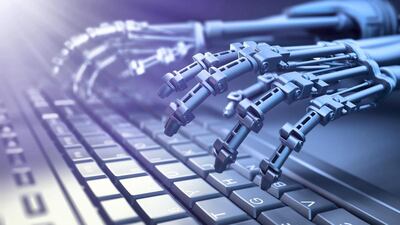The rise of the robots may be closer than we think - but the human touch will still prove vital in the future.
The impact of automation and robotics was discussed at a TechTalks seminar on day two of the Gitex Technology Week, being held at Dubai World Trade Centre.
From taking over giant warehouses operations like those used by Amazon that were once reliant on manual labour, to replacing immigration officials to speed up the flow of travellers through busy airport terminals, the robot workforce is making its presence felt in a variety of ways.
Robots are now firmly embedded into society, and their influence is only going to become more entrenched in everyday life, said a leading digital retailer.
“We used to imagine robotics were the kind of things you would see in Star Wars, but the reality is a lot different and more subtle,” said Ashish Panjabi, chief operating officer at electronic retail group, Jacky’s
“They have a variety of functions, and are used when humans can define a problem and then solve it with robotics.
“It is being used more commonly in retail. This is becoming a more common aspect of customer engagement.”
‘Pepper’ was the first robot in the world capable of reading and responding to human emotion used in Nescafe stores in Japan.
Through voice and emotion recognition technology, Pepper could read people’s facial expressions and listen to their tone of voice to analyse how they’re feeling to determine which product they may be most suitable for.
In 2012, Amazon acquired Kiva Systems, a maker of robots that service warehouses, for $775 million to expand its vast network of warehouses and improve its margins replacing human error and speed up operations.
Students in the UAE are already planning for a future in which robotics will have a great influence on their careers and lives.
“Our students are looking to the future to ask what will their jobs look like and how will their engineering skills be applied,” said Matthew Karau, assistant professor at New York University, Abu Dhabi.
“We have seen how this is now used in logistics. Rather than improve the capabilities of a forklift truck in a warehouse system, for example, shelving systems are now operated robotically to change the way the whole system now operates.
“We can see these transformations also happening at the service level of healthcare.
“Our students in the UAE can make a huge impact in this region by taking their ideas and designs to the rest of the world.”
___________________
Read more:
WATCH: Walking through Dubai airport's virtual aquarium security tunnel
Exclusive: Full body health scanners chosen for UAE trial to aid early diagnosis
Governments must control the rise of artificial intelligence, experts say
_________________
The Dubai Future Accelerators program is a collaboration between top international companies and entrepreneurs to address seven key “21st century opportunities”.
This includes the application of cutting edge technologies like AI and robotics, genomics, 3D printing, distributed ledgers and biotechnology, as well as new business models and ways of working.
“We are looking at different applications within government, and want to use robotics for tasks where humans would either get tired or have their judgement impaired by emotion,” said Khalifa Al Qama, head of future platforms at the Dubai Future Foundation that is hosting the program.
“If they can do the same job better and faster, then it is a consideration.
“Robots are going to come into the world in all areas, including the working environment.
“We want to use robots in areas where humans should not be working because of safety, or where humans cannot work effectively.”


